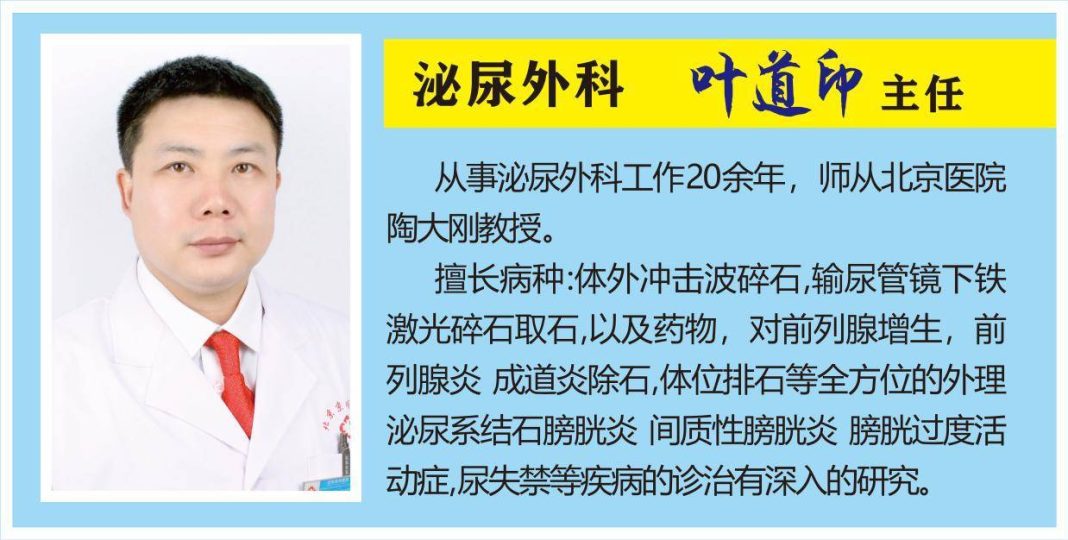Benign prostatic hyperplasia, as a common urological disease in older men, its management and prevention are crucial for improving the quality of life of patients. Today, Director Ye Daoyin of Jing Shun Urology will share some important considerations, hoping that patients with benign prostatic hyperplasia can pay attention to their families.
1. Dietary adjustments
Patients with benign prostatic hyperplasia need to pay special attention to their diet, avoiding spicy, greasy, and irritating foods such as chili peppers, black pepper, and fried foods, as these may irritate the prostate and worsen the condition. On the contrary, they should consume more fiber-rich foods, such as vegetables, fruits, and whole grains, which help keep bowel movements smooth and reduce pressure on the prostate. Additionally, drinking an adequate amount of water is also extremely important; it is recommended to maintain a daily water intake of 1500 to 2000 milliliters, which helps dilute urine and relieve irritation to the prostate.
2. Regular check-ups
Regular prostate examinations are key to monitoring changes in the condition and timely detection and management of complications. Patients should follow their doctor’s advice to regularly undergo prostate-specific antigen (PSA) tests and prostate ultrasounds to understand the size, shape, and functional status of the prostate. These examinations not only help assess the condition but also provide important evidence for developing treatment plans.
3. Moderate exercise
Moderate exercise can greatly benefit patients with benign prostatic hyperplasia. Aerobic exercises like walking, jogging, and swimming can enhance physical fitness and improve blood circulation, thereby alleviating prostatic congestion. However, patients should avoid intense exercise, particularly prolonged cycling or sitting for long periods, as these activities may increase the burden on the prostate and be detrimental to controlling the condition.
4. Avoid getting cold
Cold stimuli may cause prostatic contractions, worsening the condition. Therefore, patients with benign prostatic hyperplasia should pay attention to warmth in their daily lives to avoid getting cold. In cold seasons, they should add clothing in a timely manner to prevent colds and other respiratory infections, to avoid aggravating their condition.
5. Emotional management
Patients with benign prostatic hyperplasia often experience anxiety, depression, and other emotional issues, which may further affect their condition. Patients should learn to adjust their mindset, maintain an optimistic attitude, actively participate in social activities, and communicate with family and friends to reduce psychological stress. A good mental state is conducive to recovery from the disease and improvement in quality of life.
6. Rational medication use
For patients requiring medication, they should use it rationally under the guidance of a doctor, avoiding self-medication or changing dosage. Different medications may produce different side effects; for example, alpha-blockers may cause lower blood pressure, and 5-alpha-reductase inhibitors may affect sexual function and breast development. Therefore, patients should closely monitor their body’s reactions during medication and seek medical attention if discomfort occurs.
7. Lifestyle adjustments
In addition to the above points, patients should also avoid excessive fatigue, ensure sufficient sleep, and limit smoking and alcohol intake. These lifestyle adjustments can help enhance the body’s immune system, reducing the recurrence and exacerbation of the disease.
Patients with benign prostatic hyperplasia need to manage their condition comprehensively from multiple aspects, including diet, exercise, warmth, emotions, and medication. Through a scientific lifestyle and rational treatment measures, the development of the condition can be effectively controlled, thereby improving quality of life. It is hoped that the above content can provide some beneficial references and assistance for patients with benign prostatic hyperplasia.


